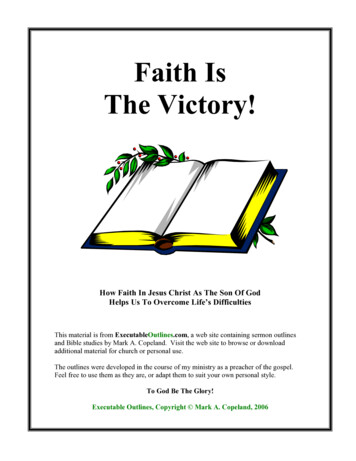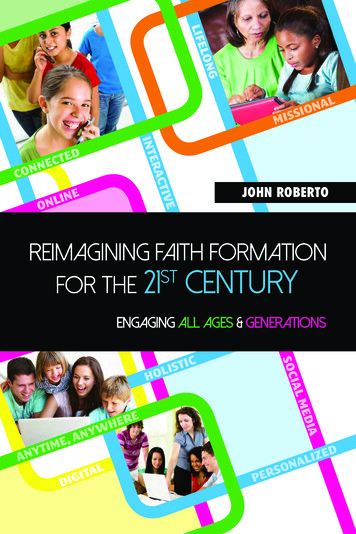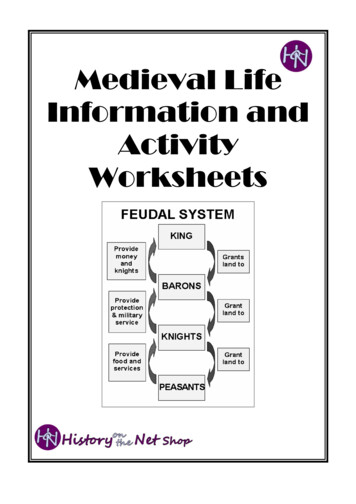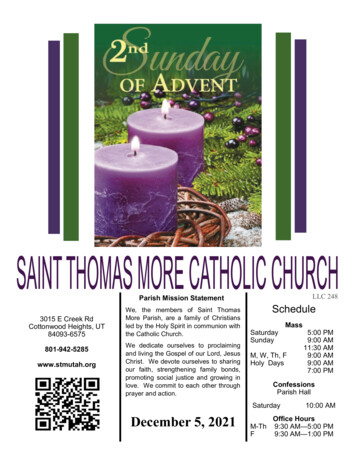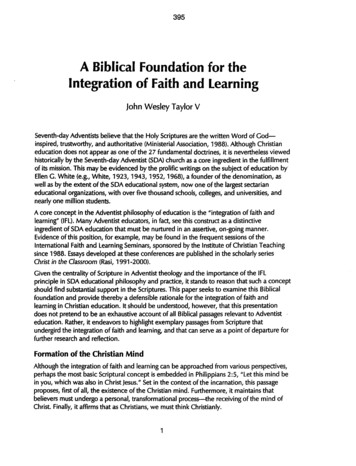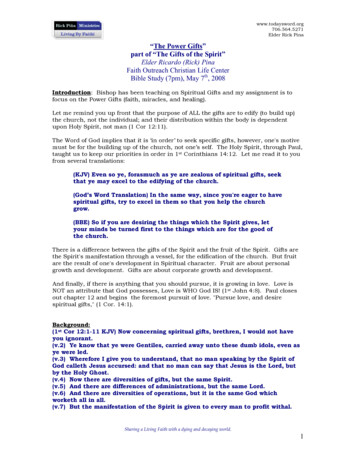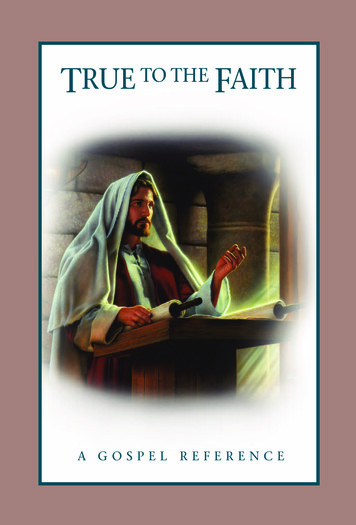
Transcription
TRUE TO THE FAITHA GOSPELREFERENCE
TRUE TO THE FAITHAGOSPELREFERENCEPublished byThe Church of Jesus Christ of Latter-day SaintsSalt Lake City, Utah
Cover: Light and Truth, by Simon Dewey by Simon Dewey 2004 by Intellectual Reserve, Inc.All rights reservedPrinted in the United States of AmericaEnglish approval: 8/03
MESSAGE FROM THEFIRST PRESIDENCYThis book is designed as a companion to yourstudy of the scriptures and the teachings of latterday prophets. We encourage you to refer to it asyou study and apply gospel principles. Use it as aresource when you prepare talks, teach classes,and answer questions about the Church.As you learn gospel truths, you will increasein your understanding of Heavenly Father’s eternal plan. With this understanding as a foundationfor your life, you will be able to make wise choices,live in harmony with God’s will, and find joy inliving. Your testimony will grow stronger. You willremain true to the faith.We are especially mindful of youth, youngsingle adults, and new converts. We promise youthat through regular personal prayer and study ofthe scriptures and the doctrines of the gospel youwill be prepared to withstand evil influences thatwould deceive you and harm you.May this book strengthen you in your effortsto draw near to the Savior and follow His example.The First Presidency1
GOSPEL TOPICSA R R A N G E D A L P H A B E T I C A L LYAaronic PriesthoodAs the Prophet Joseph Smith translated the Book ofMormon, he found mention of baptism for the remission ofsins. On May 15, 1829, he and his scribe Oliver Cowdery wentinto the woods to inquire of the Lord concerning baptism. Asthey prayed, “a messenger from heaven descended in a cloudof light.” This messenger was John the Baptist, the prophetwho had baptized Jesus Christ centuries earlier. John theBaptist, now a resurrected being, laid his hands on Josephand on Oliver and conferred upon each of them the AaronicPriesthood, which had been taken from the earth during theGreat Apostasy. With this authority, Joseph and Oliver wereable to baptize one another. (See Joseph Smith—History1:68–72.)In the Church today, worthy male members may receivethe Aaronic Priesthood beginning at age 12. They receive manyopportunities to participate in sacred priesthood ordinancesand give service. As they worthily fulfill their duties, they actin the name of the Lord to help others receive the blessings ofthe gospel.The offices of the Aaronic Priesthood are bishop, priest,teacher, and deacon. With the authorization of the presidingpriesthood leader (usually the bishop or branch president),deacons pass the sacrament. They help the bishop or branchpresident watch over Church members by giving service andassisting with temporal matters such as gathering fast offerings. Teachers may perform all the duties of deacons, andthey also receive other opportunities to serve. They preparethe sacramental bread and water and serve as home teachers.Priests may perform all the duties of deacons and teachers.With the authorization of the presiding priesthood leader,3
Abortionthey may also bless the sacrament, baptize, and ordain othersto the offices of priest, teacher, and deacon.The Aaronic Priesthood is “an appendage to the greater,or the Melchizedek Priesthood” (D&C 107:14). It is oftencalled the preparatory priesthood. As a priesthood holderserves in the Aaronic Priesthood, he prepares to receive theMelchizedek Priesthood, to receive the blessings of the temple,to serve a full-time mission, to be a loving husband andfather, and to continue in lifelong service to the Lord.See also Melchizedek Priesthood; PriesthoodAbortionIn today’s society, abortion has become a common practice, defended by deceptive arguments. If you face questionsabout this matter, you can be secure in following the revealedwill of the Lord. Latter-day prophets have denounced abortion, referring to the Lord’s declaration, “Thou shalt not . . .kill, nor do anything like unto it” (D&C 59:6). Their counselon the matter is clear: Members of The Church of Jesus Christof Latter-day Saints must not submit to, perform, encourage,pay for, or arrange for an abortion. If you encourage an abortion in any way, you may be subject to Church discipline.Church leaders have said that some exceptional circumstances may justify an abortion, such as when pregnancy is theresult of incest or rape, when the life or health of the motheris judged by competent medical authority to be in seriousjeopardy, or when the fetus is known by competent medicalauthority to have severe defects that will not allow the babyto survive beyond birth. But even these circumstances do notautomatically justify an abortion. Those who face such circumstances should consider abortion only after consultingwith their local Church leaders and receiving a confirmationthrough earnest prayer.When a child is conceived out of wedlock, the best optionis for the mother and father of the child to marry and work4
Abrahamic Covenanttoward establishing an eternal family relationship. If a successful marriage is unlikely, they should place the child foradoption, preferably through LDS Family Services (see“Adoption,” pages 7– 8).Abrahamic CovenantAbraham received the gospel and was ordained a highpriest (see D&C 84:14; Abraham 1:2). He later entered intocelestial marriage, which is the covenant of exaltation (seeD&C 131:1–4; 132:19, 29). In connection with the covenantshe made, he received great promises from the Lord concerning his family. Among these promises were the following: His posterity would be numerous (see Genesis 17:5–6;Abraham 2:9; 3:14). His seed, or descendants, would receive the gospeland bear the priesthood (see Abraham 2:9). Through the ministry of his seed, “all the families of theearth [would] be blessed, even with the blessings ofthe Gospel, which are the blessings of salvation, evenof life eternal” (Abraham 2:11).Together, all the covenants and promises that Abrahamreceived from the Lord are called the Abrahamic covenant. Itis an everlasting covenant that extends to all of Abraham’sseed (see Genesis 17:7). To be counted as Abraham’s seed, anindividual must obey the laws and ordinances of the gospel.Then that person can receive all the blessings of the Abrahamiccovenant, even if he or she is not a literal descendant ofAbraham (see Galatians 3:26–29; 4:1–7; D&C 84:33–40).As a member of The Church of Jesus Christ of Latter-daySaints, you are a child of the covenant (see 3 Nephi 20:25–26).You have received the everlasting gospel and inherited thesame promises given to Abraham, Isaac, and Jacob. You havethe right to the blessings of the priesthood and to eternal life,according to your faithfulness in receiving the ordinances of5
Abusesalvation and keeping the associated covenants. Nationsof the earth will be blessed by your efforts and by the labors ofyour posterity.See also Covenant; Eternal Life; Ordinances; Patriarchal Blessings;PriesthoodAbuseAbuse is the treatment of others or self in a way thatcauses injury or offense. It harms the mind and the spirit andoften injures the body as well. It can cause confusion, doubt,mistrust, and fear. It is a violation of the laws of society andis in total opposition to the teachings of the Savior. The Lordcondemns abusive behavior in any form—physical, sexual,verbal, or emotional. Abusive behavior may lead to Churchdiscipline.Counsel for the AbuserIf you have been abusive in any relationship, you mustrepent of your sin. Plead with the Lord to forgive you. Askfor forgiveness from those you have harmed. Speak withyour bishop or branch president so he can help you throughthe repentance process and, if necessary, help you receiveadditional counseling or other assistance.If feelings of anger have fueled your abusive behavior,learn to master your temper. Go to the Lord in prayer and askHim to help you. With an eternal perspective, you will seethat your anger has almost always come in response to thingsthat are not very important.If you have been guilty of sexual abuse, seek to disciplineyour mind. Remember that your thoughts have a powerfulimpact on your life—“as [a man] thinketh in his heart, sois he” (Proverbs 23:7). Stay away from pornography andanything else that could stimulate immoral sexual desire.Pray for the ability to “let virtue garnish thy thoughtsunceasingly” (D&C 121:45).6
AdoptionHelp for Victims of AbuseIf you are a victim of abuse, seek help immediately. Talkwith your priesthood leader, normally your bishop or branchpresident but at times a member of the stake or district presidency. He can help you know what to do.Be assured that you are not to blame for the harmfulbehavior of others. You do not need to feel guilt. If you havebeen a victim of rape or other sexual abuse, whether youhave been abused by an acquaintance, a stranger, or even afamily member, you are not guilty of sexual sin. Know thatyou are innocent and that your Heavenly Father loves you.Pray for the peace that comes only through Jesus Christand His Atonement (see John 14:27; 16:33). The Savior hasexperienced all your pains and afflictions, even those causedby others, and He knows how to help you (see Alma 7:11–12).Rather than seek revenge, focus on matters you can control,such as your own outlook on life. Pray for the strength to forgive those who have hurt you.Continue to seek help from your priesthood leader so hecan guide you through the process of emotional healing.Through the blessings of the gospel, you can stop the cycle ofabuse and be freed from the suffering you have experienced.Additional references: Matthew 18:1–6; D&C 121:34–46See also Forgiveness; RepentanceAddiction (See Gambling; Pornography; Word of Wisdom)AdoptionChildren are entitled to be raised by parents who honormarital vows and who provide love and support. Adoptioncan be a great blessing for many children who are born without this opportunity.When a child is conceived out of wedlock, the bestoption is for the mother and father of the child to marry andwork toward establishing an eternal family relationship. If a7
Adulterysuccessful marriage is unlikely, they should place the childfor adoption, preferably through LDS Family Services.Placing the infant for adoption through LDS Family Serviceshelps unwed parents do what is best for the child. It ensuresthat the child will be sealed to a mother and a father in thetemple, and it enhances the prospect for the blessings of thegospel in the lives of all concerned. Adoption is an unselfish,loving decision that blesses the birth parents, the child, andthe adoptive family.If you are married and you and your spouse want toadopt a child, be sure you know all legal requirements of thecountries and governmental agencies that are involved.Counsel with your priesthood leaders and, if possible, withstaff members in LDS Family Services. If LDS Family Servicesis not available in your area, work with your priesthood leaders to locate licensed, authorized agencies that protect boththe children and the adoptive parents.Adultery (See Chastity)AdversityAs part of Heavenly Father’s plan of redemption, youexperience adversity during mortality. Trials, disappointments, sadness, sickness, and heartache are a difficult part oflife, but they can lead to spiritual growth, refinement, andprogress as you turn to the Lord.Adversity comes from different sources. You may attimes face trials as a consequence of your own pride and disobedience. These trials can be avoided through righteous living. Other trials are simply a natural part of life and maycome at times when you are living righteously. For example,you may experience trials in times of sickness or uncertaintyor at the deaths of loved ones. Adversity may sometimescome because of others’ poor choices and hurtful words andactions.8
AdversityResponding to Adversity with FaithYour success and happiness, both now and in the eternities, depend largely on your responses to the difficulties of life.An account in the Book of Mormon illustrates differentresponses to adversity. The prophet Lehi and his family hadbeen traveling in the wilderness for several days, using theirbows and arrows to hunt for food. The family encountereddifficulties when Lehi’s sons lost the use of their bows.Laman and Lemuel’s bows lost their spring, and Nephi’sbroke. Hungry and tired, Laman and Lemuel began to complain against the Lord. Even Lehi began to murmur. Nephi,on the other hand, refused to be discouraged. He went towork. He recounted: “I, Nephi, did make out of wood a bow,and out of a straight stick, an arrow; wherefore, I did armmyself with a bow and an arrow, with a sling and withstones. And I said unto my father: Whither shall I go toobtain food?” Humbled because of Nephi’s words, Lehiasked the Lord where they should go for food. The Lordanswered his prayers and led Nephi to a place where hecould obtain food. (See 1 Nephi 16:15–31.)When some people face adversity, they are like Lamanand Lemuel. They complain and become bitter. They askquestions like “Why does this have to happen to me? Why doI have to suffer this now? What have I done to deserve this?”But these questions have the power to dominate theirthoughts. Such questions can overtake their vision, absorbtheir energy, and deprive them of the experiences the Lordwants them to receive. Rather than responding in this way,you should follow Nephi’s example. Consider asking questions such as, “What am I to do? What am I to learn from thisexperience? What am I to change? Whom am I to help? Howcan I remember my many blessings in times of trial?”Different kinds of adversity require different responses.For example, if you are stricken with illness, you maysimply need to be patient and faithful. If you suffer because9
Adversityof others’ words or actions, you should work toward forgiving those who have offended you. If you are a victim ofabuse, you should seek help immediately. If trials comebecause of your own disobedience, you should correct yourbehavior and humbly seek forgiveness.Although some of your responses to adversity will vary,one response should be constant—your trust in HeavenlyFather and Jesus Christ. The prophet Alma taught, “Whosoevershall put their trust in God shall be supported in their trials,and their troubles, and their afflictions, and shall be lifted upat the last day” (Alma 36:3).Trusting in Heavenly Father and Jesus ChristWhen you trust in the Father and the Son, you are confident that They love you perfectly—that They want you to behappy and that They will help you grow spiritually. You keepthe commandments. You seek to know Their will, and you dowhat They require even when you desire something else.Your prayers for relief are accompanied by the understanding that Heavenly Father will not resolve all matters immediately—that He may allow you to wait so you can continueto learn and grow. Through it all, you find comfort in theassurance that the Savior understands your trials perfectly.As part of His infinite Atonement, He took upon Himself“the pains and the sicknesses of his people.” He took uponHimself “their infirmities, that his bowels may be filled withmercy, according to the flesh, that he may know according tothe flesh how to succor his people according to their infirmities” (Alma 7:11–12). Because He has experienced your pain,He knows how to help you. If you look to Him in faith, Hewill strengthen you to withstand any trial you experience.As you strive to trust the Lord during times of trial,remember the following counsel given through the ProphetJoseph Smith:“He that is faithful in tribulation, the reward of the sameis greater in the kingdom of heaven.10
Adversity“Ye cannot behold with your natural eyes, for the presenttime, the design of your God concerning those things whichshall come hereafter, and the glory which shall follow aftermuch tribulation.“For after much tribulation come the blessings” (D&C58:2–4).Finding Peace and Joy during AdversityYou can find peace and joy even when you wrestle withchallenges and sadness. The Book of Mormon includes anaccount of a righteous people who learned this truth.Suffering in bondage under a cruel ruler, they poured outtheir hearts to God (see Mosiah 24:8–12). The Lord answered:“Lift up your heads and be of good comfort, for I knowof the covenant which ye have made unto me; and I willcovenant with my people and deliver them out of bondage.“And I will also ease the burdens which are put uponyour shoulders, that even you cannot feel them upon yourbacks, even while you are in bondage; and this will I do thatye may stand as witnesses for me hereafter, and that ye mayknow of a surety that I, the Lord God, do visit my people intheir afflictions” (Mosiah 24:13–14).The people responded with faith, and “the burdenswhich were laid upon [them] were made light; yea, the Lorddid strengthen them that they could bear up their burdenswith ease, and they did submit cheerfully and with patienceto all the will of the Lord” (Mosiah 24:15).Like these righteous people, you can “submit cheerfullyand with patience to all the will of the Lord,” knowing thatHe will strengthen you in your trials. He has promised, “Allthings wherewith you have been afflicted shall work togetherfor your good, and to my name’s glory” (D&C 98:3).Additional references: Hebrews 4:15–16; 2 Nephi 2:11–24; Mosiah23:21–22; D&C 105:6; 121:7–9; 122See also Forgiveness; Hope; Peace; Plan of Salvation; Repentance11
AgencyAgencyYour Heavenly Father has given you agency, the abilityto choose and to act for yourself. Agency is essential in theplan of salvation. Without it, you would not be able to learnor progress or follow the Savior. With it, you are “free tochoose liberty and eternal life, through the great Mediator ofall men, or to choose captivity and death, according to thecaptivity and power of the devil” (2 Nephi 2:27).You had the power to choose even before you were born.In the premortal Council in Heaven, Heavenly Father presented His plan, which included the principle of agency.Lucifer rebelled and “sought to destroy the agency of man”(Moses 4:3). As a result, Lucifer and all those who followedhim were denied the privilege of receiving a mortal body.Your presence on the earth confirms that you exercised youragency to follow Heavenly Father’s plan.In mortality, you continue to have agency. Your use ofthis gift determines your happiness or misery in this life andin the life to come. You are free to choose and act, but you arenot free to choose the consequences of your actions. The consequences may not be immediate, but they will always follow. Choices of good and righteousness lead to happiness,peace, and eternal life, while choices of sin and evil eventually lead to heartache and misery.You are responsible for the decisions you make. Youshould not blame your circumstances, your family, or yourfriends if you choose to disobey God’s commandments. Youare a child of God with great strength. You have the ability tochoose righteousness and happiness, regardless of your circumstances.You are also responsible for developing the abilities andtalents Heavenly Father has given you. You are accountableto Him for what you do with your abilities and how you useyour time. Do not idle away your time. Be willing to workhard. Choose to do many good things of your own free will.12
ApostasyAdditional references: Deuteronomy 11:26 –28; 30:15–20; Joshua24:14 –15; 2 Nephi 2; Helaman 14:30–31; D&C 58:26–28; 101:78See also Obedience; Plan of Salvation; TemptationAlcohol (See Word of Wisdom)ApostasyWhen individuals or groups of people turn away fromthe principles of the gospel, they are in a state of apostasy.Periods of general apostasy have occurred throughoutthe history of the world. After times of righteousness, peoplehave often turned to wickedness. One example is the GreatApostasy, which occurred after the Savior established HisChurch. After the deaths of the Savior and His Apostles, mencorrupted the principles of the gospel and made unauthorized changes in Church organization and priesthood ordinances. Because of this widespread wickedness, the Lordwithdrew the authority of the priesthood from the earth.During the Great Apostasy, people were without divinedirection from living prophets. Many churches were established, but they did not have priesthood power to lead peopleto the true knowledge of God the Father and Jesus Christ.Parts of the holy scriptures were corrupted or lost, and noone had the authority to confer the gift of the Holy Ghost orperform other priesthood ordinances. This apostasy lasteduntil Heavenly Father and His Beloved Son appeared toJoseph Smith in 1820 and initiated the restoration of the fulness of the gospel.We now live in a time when the gospel of Jesus Christ hasbeen restored. But unlike the Church in times past, TheChurch of Jesus Christ of Latter-day Saints will not be overcome by general apostasy. The scriptures teach that theChurch will never again be destroyed (see D&C 138:44; seealso Daniel 2:44).13
ApostleAlthough there will not be another general apostasyfrom the truth, we must each guard against personal apostasy. You can safeguard yourself against personal apostasy bykeeping your covenants, obeying the commandments, following Church leaders, partaking of the sacrament, and constantly strengthening your testimony through daily scripturestudy, prayer, and service.Additional references: Isaiah 24:5; Amos 8:11–12; Matthew 24:4–14; Acts20:28–30; 2 Timothy 3:1–5, 14–15; 4:3–4; 1 Nephi 13:24–29; Mormon1:13–14; D&C 1:15–17; Joseph Smith—History 1:17–19See also Church Administration; Priesthood; Restoration of the GospelApostle (See Church Administration; Prophets)Area Authority Seventy (See Church Administration)Articles of FaithThe Articles of Faith outline 13 basic points of beliefamong members of The Church of Jesus Christ of Latter-daySaints. The Prophet Joseph Smith first wrote them in a letterto John Wentworth, a newspaper editor, in response to Mr.Wentworth’s request to know what members of the Churchbelieved. They were subsequently published in Church periodicals. They are now regarded as scripture and included inthe Pearl of Great Price.Atonement of Jesus ChristThe word atone means to reconcile, or to restore to harmony. Through the Atonement of Jesus Christ, we can be reconciled to our Heavenly Father (see Romans 5:10–11; 2 Nephi25:23; Jacob 4:11). We can ultimately dwell in His presenceforever, having been “made perfect through Jesus” (see D&C76:62, 69).14
Atonement of Jesus ChristJesus Christ “was prepared from the foundation of theworld to redeem [His] people” (Ether 3:14). In the premortalspirit world, Heavenly Father presented the eternal plan ofsalvation, which required an infinite and eternal Atonement.The premortal Jesus, then known as Jehovah, humblydeclared that He would do the will of the Father in fulfillingthe plan (see Moses 4:2). Thus He was foreordained to carryout the Atonement—to come to the earth, suffer the penaltyfor our sins, die on the cross, and be resurrected. He became“the Lamb slain from the foundation of the world”(Revelation 13:8; see also 1 Peter 1:19–20; Moses 7:47).The Atonement is the supreme expression of ourHeavenly Father’s love for us (see John 3:16). It is also thegreatest expression of the Savior’s love for the Father and forus (see John 14:28–31; 15:9–13; 1 John 3:16; D&C 34:3;138:1–4).Our Need for the AtonementAs descendants of Adam and Eve, all people inherit theeffects of the Fall. We all experience spiritual death, beingseparated from the presence of God, and we are all subject totemporal death, which is the death of the physical body (seeAlma 42:6–9; D&C 29:41–42).In our fallen state, we are subject to opposition andtemptation. When we give in to temptation, we distance ourselves from God and come short of His glory (see Romans3:23).Eternal justice demands that the effects of the Fall remainand that we be punished for our own wrongdoings. Withoutthe Atonement, spiritual and temporal death would place animpassable barrier between us and God. Because we cannotsave ourselves from the Fall or from our own sins, we wouldbe forever separated from our Heavenly Father, for “nounclean thing can dwell . . . in his presence” (Moses 6:57).15
Atonement of Jesus ChristThe only way for us to be saved is for someone else torescue us. We need someone who can satisfy the demands ofjustice—standing in our place to assume the burden of theFall and to pay the price for our sins. Jesus Christ has alwaysbeen the only one capable of making such a sacrifice.Jesus Christ, Our Only HopeFrom before the Creation of the earth, the Savior hasbeen our only hope for “peace in this world, and eternal lifein the world to come” (D&C 59:23).Only He had the power to lay down His life and take itup again. From His mortal mother, Mary, He inherited theability to die. From His immortal Father, He inherited thepower to overcome death. He declared, “As the Father hathlife in himself; so hath he given to the Son to have life in himself” ( John 5:26).Only He could redeem us from our sins. God the Fathergave Him this power (see Helaman 5:11). The Savior was ableto receive this power and carry out the Atonement becauseHe kept Himself free from sin: “He suffered temptations butgave no heed unto them” (D&C 20:22). Having lived a perfect, sinless life, He was free from the demands of justice.Because He had the power of redemption and because He hadno debt to justice, he could pay the debt for those who repent.He can say:“Father, behold the sufferings and death of him who didno sin, in whom thou wast well pleased; behold the blood ofthy Son which was shed, the blood of him whom thou gavestthat thyself might be glorified;“Wherefore, Father, spare these my brethren that believeon my name, that they may come unto me and have everlasting life” (D&C 45:4–5).Truly, “there shall be no other name given nor any otherway nor means whereby salvation can come unto the children of men, only in and through the name of Christ, the LordOmnipotent” (Mosiah 3:17).16
Atonement of Jesus ChristThe Atoning SacrificeJesus’s atoning sacrifice took place in the Garden ofGethsemane and on the cross at Calvary. In Gethsemane Hesubmitted to the will of the Father and began to take uponHimself the sins of all people. He has revealed some of whatHe experienced as He paid the price for our sins:“I, God, have suffered these things for all, that theymight not suffer if they would repent;“But if they would not repent they must suffer even as I;“Which suffering caused myself, even God, the greatestof all, to tremble because of pain, and to bleed at every pore,and to suffer both body and spirit—and would that I mightnot drink the bitter cup, and shrink—“Nevertheless, glory be to the Father, and I partook andfinished my preparations unto the children of men” (D&C19:16–19; see also Luke 22:44; Mosiah 3:7).The Savior continued to suffer for our sins when Heallowed Himself to be crucified—“lifted up upon the crossand slain for the sins of the world” (1 Nephi 11:33).On the cross, He allowed Himself to die. His body wasthen laid in a tomb until He was resurrected and became “thefirstfruits of them that slept” (1 Corinthians 15:20). ThroughHis death and Resurrection, He overcame physical death forus all. He later said:“I came into the world to do the will of my Father,because my Father sent me.“And my Father sent me that I might be lifted up uponthe cross; and after that I had been lifted up upon the cross,that I might draw all men unto me, that as I have been liftedup by men even so should men be lifted up by the Father, tostand before me, to be judged of their works, whether they begood or whether they be evil—“And for this cause have I been lifted up; therefore,according to the power of the Father I will draw all men untome, that they may be judged according to their works.17
Atonement of Jesus Christ“And it shall come to pass, that whoso repenteth and isbaptized in my name shall be filled; and if he endureth to theend, behold, him will I hold guiltless before my Father at thatday when I shall stand to judge the world” (3 Nephi27:13–16).Universal Redemption from the FallThrough the Atonement, Jesus Christ redeems all peoplefrom the effects of the Fall. All people who have ever lived onthe earth and who ever will live on the earth will be resurrected and brought back into the presence of God to bejudged (see 2 Nephi 2:5–10; Helaman 14:15–17). Through theSavior’s gift of mercy and redeeming grace, we will allreceive the gift of immortality and live forever in glorified,resurrected bodies.Salvation from Our SinsAlthough we are redeemed unconditionally from theuniversal effects of the Fall, we are accountable for our ownsins. But we can be forgiven and cleansed from the stain of sinif we “apply the atoning blood of Christ” (Mosiah 4:2). Wemust exercise faith in Jesus Christ, repent, be baptized for theremission of sins, and receive the gift of the Holy Ghost.Alma counseled:“Ye must repent, and be born again; for the Spirit saith ifye are not born again ye cannot inherit the kingdom of heaven; therefore come and be baptized unto repentance, that yemay be washed from your sins, that ye may have faith on theLamb of God, who taketh away the sins of the world, who ismighty to save and to cleanse from all unrighteousness”(Alma 7:14).The Gift of Eternal LifeThe Savior has declared that eternal life is “the greatestof all the gifts of God” (D&C 14:7). To gain eternal life is to be18
Atonement of Jesus Christmade worthy to dwell in God’s presence, inheriting a placein the highest degree of the celestial kingdom. This gift isavailable only through the Atonement of Jesus Christ.Mormon said: “What is it that ye shall hope for? Behold I sayunto you that ye shall have hope through the atonement ofChrist and the power of his resurrection, to be raised unto lifeeternal, and this because of your faith
Saints, you are a child of the covenant (see 3 Nephi 20:25–26). You have received the everlasting gospel and inherited the same promises givento Abraham, Isaac, and Jacob. You have the right to the blessings of the priesthood and to eternal life, according to your faithfu




